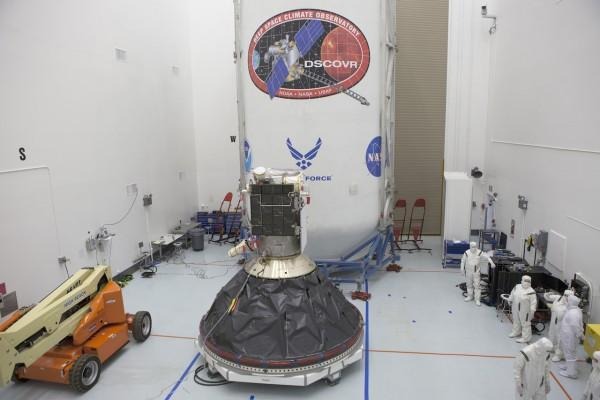Glitch Scrubs SpaceX Sun-Spy Satellite Launch
SpaceX's plans to launch a new satellite intended to monitor solar wind were scrubbed last-minute on Sunday, though the ambitious rocket start-up isn't to blame. The Falcon 9 rocket should have been SpaceX's fifteenth to launch – and its first deep-space mission – taking a satellite dubbed DSCOVR into orbit for the US government. However, glitches with the Air Force radar system that SpaceX was to use to track the rocket's booster stage meant takeoff was cancelled with less than three minutes to go.
Without the radar, the flight control team can't monitor where the rocket is, precisely, and potentially trigger the remote destruct if it unexpectedly goes off-course.
A new launch time has tentatively been set for later today, at 6:07pm EST. If all goes to plan, it will see SpaceX go further than on any previous flight, roughly four times the distance of the moon from Earth.
The delay will also give SpaceX time to perform some non-essential maintenance. As has become his habit, SpaceX founder Elon Musk took to Twitter to confirm that engineers would be swapping out a video transmitter for the first stage.
Prob good though. Will give us time to replace 1st stage video transmitter (not needed for launch, but nice to have).
— Elon Musk (@elonmusk) February 8, 2015
DSCOVR, or the Deep Space Climate Observatory, is part of the US government's attempts to better monitor and understand weather conditions in space. From an orbit around 930,000 miles above the Earth, it will track solar and geomagnetic storms triggered by solar winds.
Such storms can cause havoc on systems like radio networks and GPS.

Meanwhile, a second batch of instruments on the satellite will watch Earth instead, tracking things like ozone levels and cloud cover. NASA intends to regularly release imagery from DSCOVR to the public, in an attempt to boost awareness of the planet's cycles on a grander scale.
The postponed take-off also delays SpaceX's second attempt to land the first stage safely for re-use, rather than see it splash down wastefully.
Musk and his team's first attempt at that – piloting the stage down onto an autonomously-navigating floating platform – failed explosively last month, though the outspoken CEO was upbeat about it as a learning experience. If successful, it could significantly cut the costs of private space launches.
